2024届高考英语二轮复习非谓语动词 V-ing 的基本语法功能 课件(共45张PPT)
文档属性
| 名称 | 2024届高考英语二轮复习非谓语动词 V-ing 的基本语法功能 课件(共45张PPT) |  | |
| 格式 | pptx | ||
| 文件大小 | 23.4MB | ||
| 资源类型 | 教案 | ||
| 版本资源 | 通用版 | ||
| 科目 | 英语 | ||
| 更新时间 | 2023-11-26 18:25:48 | ||
图片预览


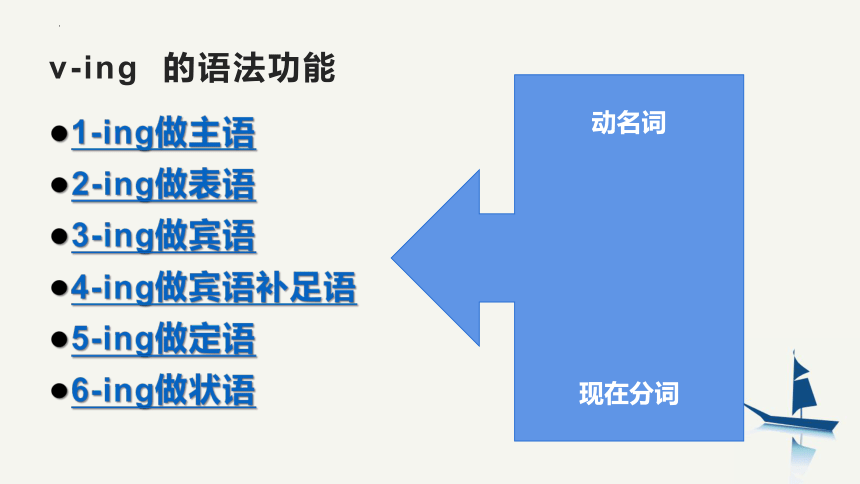
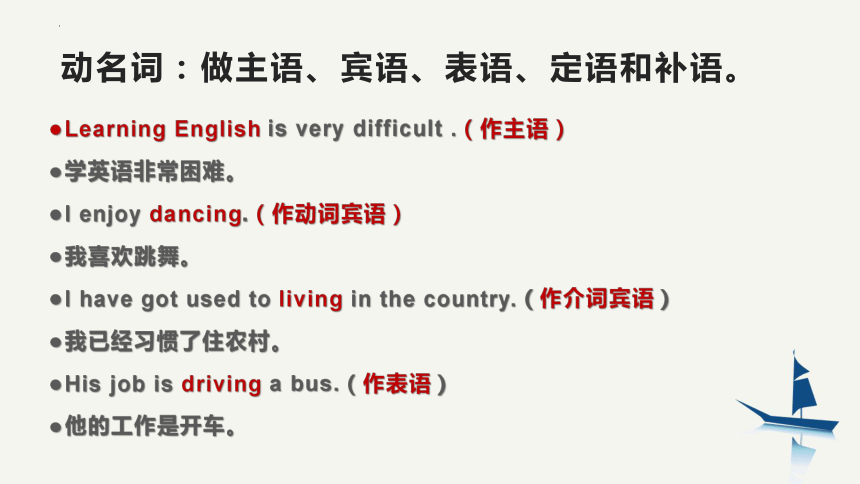
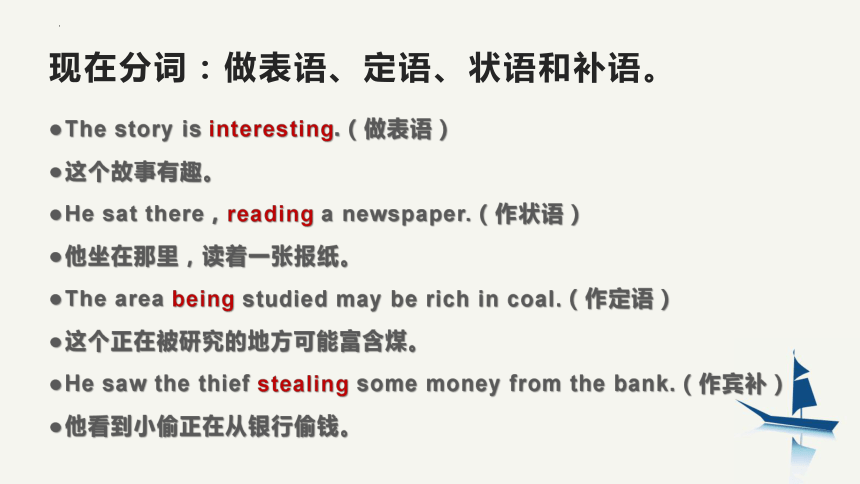

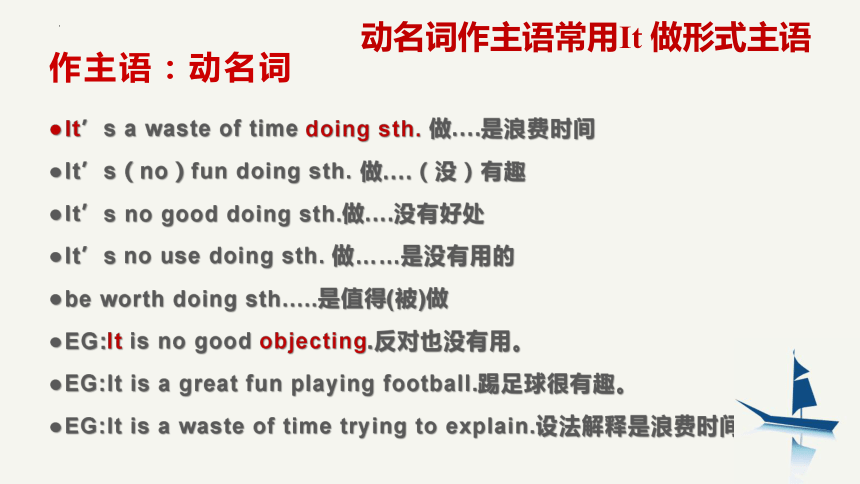
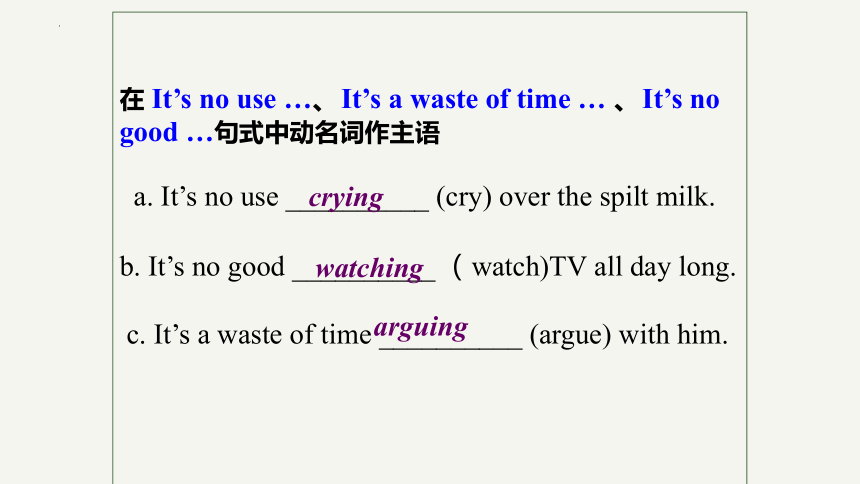


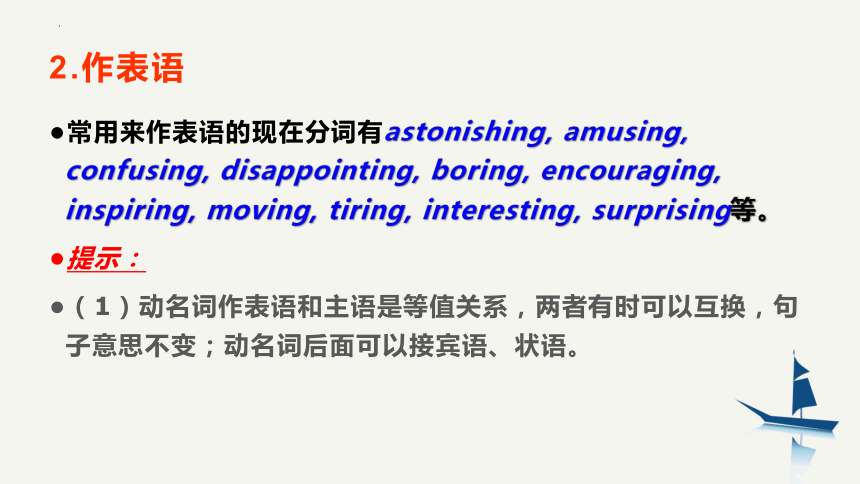
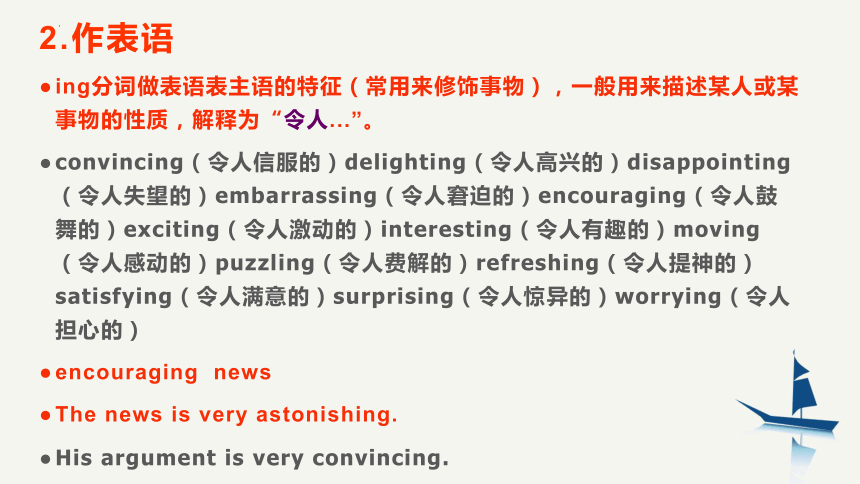
文档简介
(共45张PPT)
非谓语动词v-ing
的基本语法功能
by lily 塔三 2023 11
高中英语语法
Losing him was blue like I've never known
失去他如此忧伤,好像我们从未相识
Missing him was dark grey all alone
想念他如同灰暗般无助孤独中无法忘却
Forgetting him was like trying to know somebody you never met
将他遗忘好比去了解一个素未谋面的人那样痛苦漫长
But loving him was red
但我记得爱他的感觉如亮红般炽烈
Loving him was red
爱他的感觉如同亮红般炽烈
v-ing 的语法功能
1-ing做主语
2-ing做表语
3-ing做宾语
4-ing做宾语补足语
5-ing做定语
6-ing做状语
动名词
现在分词
动名词:做主语、宾语、表语、定语和补语。
Learning English is very difficult .(作主语)
学英语非常困难。
I enjoy dancing.(作动词宾语)
我喜欢跳舞。
I have got used to living in the country.(作介词宾语)
我已经习惯了住农村。
His job is driving a bus.(作表语)
他的工作是开车。
现在分词:做表语、定语、状语和补语。
The story is interesting.(做表语)
这个故事有趣。
He sat there,reading a newspaper.(作状语)
他坐在那里,读着一张报纸。
The area being studied may be rich in coal.(作定语)
这个正在被研究的地方可能富含煤。
He saw the thief stealing some money from the bank.(作宾补)
他看到小偷正在从银行偷钱。
作主语
Teaching is my full-time job.
Learning to use a language is different from studying a language.
动名词作主语常用It 做形式主语。
Playing football is a great fun.
It is a great fun playing football.
作主语:动名词
It’s a waste of time doing sth. 做....是浪费时间
It’s(no)fun doing sth. 做....(没)有趣
It’s no good doing sth.做....没有好处
It’s no use doing sth. 做……是没有用的
be worth doing sth.....是值得(被)做
EG:It is no good objecting.反对也没有用。
EG:It is a great fun playing football.踢足球很有趣。
EG:It is a waste of time trying to explain.设法解释是浪费时间
动名词作主语常用It 做形式主语
在 It’s no use …、It’s a waste of time … 、It’s no good …句式中动名词作主语
a. It’s no use __________ (cry) over the spilt milk.
b. It’s no good __________ (watch)TV all day long.
c. It’s a waste of time __________ (argue) with him.
crying
watching
arguing
1. ---What do you think made Mary so upset
---____ her new bicycle.
A. As she lost B. Lost C. Losing D. Because of losing
2._____is a good of exercise for both the young and the old.
A.The walk B.Walking C.To walk D.Walk
3. It was so cold that they kept the fire ________all night.
A. to burn B. burn C. burning D. burned
C
B
C
2.作表语
My job is teaching.
= Teaching is my job. 动名词
我们最大的幸福是为人民服务。
Our greatest happiness is serving the people.(动名词)
他的话很鼓舞人。
His words are encouraging. (现在分词)
2.作表语
常用来作表语的现在分词有astonishing, amusing, confusing, disappointing, boring, encouraging, inspiring, moving, tiring, interesting, surprising等。
提示:
(1)动名词作表语和主语是等值关系,两者有时可以互换,句子意思不变;动名词后面可以接宾语、状语。
2.作表语
ing分词做表语表主语的特征(常用来修饰事物),一般用来描述某人或某事物的性质,解释为“令人...”。
convincing(令人信服的)delighting(令人高兴的)disappointing(令人失望的)embarrassing(令人窘迫的)encouraging(令人鼓舞的)exciting(令人激动的)interesting(令人有趣的)moving(令人感动的)puzzling(令人费解的)refreshing(令人提神的)satisfying(令人满意的)surprising(令人惊异的)worrying(令人担心的)
encouraging news
The news is very astonishing.
His argument is very convincing.
The film was so _____ that all of us were ______ to tears.
A. moved; moving B. moving; moved
C. moving; moving D. moved; moved
作宾语:动名词
动名词或动名词短语作宾语(动词宾语或介词宾语):
I have just fininished doing my homework.
The children are fond of listeningto pop music.
I suggested asking his brother for some money.
He keeps buying expensive maps. He must have more than 200 by now.
作宾语:动名词
只接动名词(不能接不定式)作宾语的28个常用动词
practice、consider、enjoy、finish、give up、imagine、keep、put off、risk、suggest、admit、advise、allow、appreciate、avoid、delay、deny、discuss、dislike、escape、excuse、fancy、forbid、mention、 mind、miss、permit、prohibit
只能用动名词作宾语的动词:
在 enjoy, finish, mind, miss, practise, suggest, insist on, give up 等动词后,再出现动词只用动名词
1) I enjoy _______ (have) a chat with the aged.
2) Have you finished _________ (read) the book
3) Do you mind my ________ (smoke) here
4) I don’t want to miss ________ (see) the singer on the TV tonight.
5) We should practise _______ (read )English every day.
6) He suggested ________ ( go )there on foot.
7) She insisted on ______ (do)it herself.
8) You should give up __________ (smoke).
9) I have the mind ___________ (study) abroad.
10) I have made up my mind ________(get) up early.
having
reading
smoking
seeing
reading
going
doing
smoking
to study
to get
The library needs ______,but it’ll have to wait until Sunday.
A. cleaning B. be cleaned C. clean D. being cleaned
—What do you think of the book
—Oh, excellent. It’s worth ______a second time.
A. to read B. to be read C. reading D. being read
A
C
作宾语:动名词
作介词的宾语
If you can't come tonight, how about coming tomorrow
如果你今晚不能来,明天怎么样?
做宾语补足语
现在分词置于某些及物动词和宾语之后, 补充说明宾语的动作或状态。现在分词作宾补表示宾补与宾语构成主动关系。在这种情况下, 及物动词通常是表示感官动词或使役动词。
做宾语补足语
.现在分词在感官动词后作宾语补足语:
在see, hear, feel, watch, notice等感官动词后, 现在分词构成复合宾语, 表示一个正在进行的主动的动作。
I heard her singing an English song when I passed by.
当我从旁经过时,我听见她正在唱英文歌。
Today on my way home, I saw a man running along the street hurriedly.
今天在我回家的路上, 我看到一个男人正匆忙从街上跑过。
能跟现在分词作宾语补足语的常见动词有这些
(一感)hear, listen to(二听)make, have, let(三让) see, watch, notice, observe(四看)
做宾语补足语
2. 现在分词在使役动词have后作宾语补足语, 表示“让……一直做某事”。否定句中也可以表示“不容许某人做某事”。
It’s cold. We should have the fire burning all the time.
天气冷。我们应该让火一直燃烧着。
I won’t have you running about in the room.
我不允许你在房间里跑来跑去。
做宾语补足语
3.常用的几个只接现在分词作宾语补足语的动词:
keep/ send/ leave sb. doing sth 使某人干某事
find/catch sb. doing sth 发现某人干某事
She kept him waiting for two hours. 她让他等了两个小时。
He caught a man putting his hand into the pocket of a passenger.
他发现一个人把手伸进了一个乘客的口袋。
做宾语补足语
4.用于with复合结构中作宾语补足语。
With so much work filling my mind, I almost break down.
我满脑子都是工作,快要崩溃了。
With Christmas approaching, a Christmas party will be held in the school.
圣诞节要到了,学校要举行一个圣诞晚会。
做宾语补足语
注意辨析:
1.感官类动词+sb do sth.(干了某事)
感官类动词+sb doing sth.(正在干某事)
He saw her enter the room.(She entered the room.) 他看见她进了屋。
He saw her working in the garden.(She was working in the garden.)他看见她在花园里干活。
2. have sb. do sth 使某人干某事
have sb. doing sth 使某人一直干某事
I’ll have Bob show you to your room. 我让鲍勃带你到房间去。
It was cold, and she had the fire burning day and night. 天很冷,她让炉火日夜烧着。
做宾语补足语
3.get sb. to do sth使某人干某事
get sb. doing sth使某人开始干起来
You should get your son to wash his clothes himself.
你应该让儿子自己洗衣服。
Something is wrong with the machine. I can’t get it running.
机器出了故障。我没法让它转动起来。
作定语
1. 单个的动词的-ing形式可以作前置定语,一般有两种含义。
①说明被修饰名词的用途和性能。
a reading room 阅览室= a room which is used for reading
running shoes= shoes for running 跑鞋
a working method 工作方法= a method of working
必背:
a sewing machine 缝纫机 a swimming pool 游泳池
a drawing board 画板 a dining car 餐车
a driving permit 驾驶许可证 a walking stick 手杖
a singing competition 歌咏比赛 a waiting room 候车室
作定语
②表示所修饰的人或物的动作或状态,在意思上接近一个定语从句,可以表示正在进行的动作,也可表示经常性动作或当时的状态。
developing countries 发展中国家 = countries that are developing
an ordinary-looking house看起来很普通的房子 = a house thatlooks ordinary
a puzzling problem 困扰人的问题 = a problem that puzzles somebody
The working people are masters of our country.劳动人民是我们国家的主人。
Let sleeping dogs lie. 不要惹麻烦。
视力
作定语
必背:
a disappointing play 令人失望的戏剧 an astonishing adventure 惊人的冒险
boiling water 正在沸腾的水a sleeping baby 熟睡的婴儿
a barking dog 狂吠的狗the setting sun 落日
the coming week 下一周failing sight 逐渐衰退的
作定语
2.作定语的-ing形式如是一个短语,则应放在被修饰词的后面。
The bottle containing vinegar should besent to the laboratory.
装着醋的那个瓶子应送到实验室去。
They lived in a house facing south.
他们住在一所朝南的房子里。
The book being discussed a lot will be published next month.
人们谈论很多的那本书下一个月将出版。
作状语
现在分词(短语)在句中作状语来修饰谓语动词或整个句子,表示动作发生的时间、原因、条件、结果、方式、让步或伴随状况。作时间、原因、条件、让步状语时多位于句首; 作结果、伴随情况状语时常位于句末。现在分词的逻辑主语必须和该句子的主语保持一致。
(一)现在分词做状语的时态和语态
①doing:与句子的主语构成主动关系,与句子的谓语动词同时发生或基本同时发生,表“主动进行”。
Walking in the park, she saw an old friend.
当她在公园里散步时,她看到了一个老朋友。
作状语
②having done:与句子的主语构成主动关系,先于谓语动词发生,表“主动完成”。
Having finished the letter, he went to post it.
他写完信后就把它寄了出去。
③having been done= done:与句子的主语构成被动关系,先于谓语动词发生,表“被动且完成”。
Shown /Having been shown around the factory, they were very happy. 被领着参观了工厂后,他们很高兴。
作状语
(二)现在分词做状语的用法
1.作时间状语(相当于when/while引导的时间状语从句)。
Hearing the news(= When they heard the news), they got excited. 听到这个消息,他们很激动。
Walking in the street(= When/While I was walking in the street), I met an old friend of mine.
我正在大街上行走时,遇到了一位老朋友。
作状语
2.作条件状语(一般放在句首,其前可以加if连词)
Reading carefully(=If you read carefully),you\'ll learn something new.
只要你仔细阅读,你会学到一些新的东西。
Working hard (=If you work hard), you’ll make great progress.
如果你努力工作,你将取得很大进步。
作状语
3.作原因状语(一般可转换成由as或because引导的原因状语从句)
Not knowing his address (= As I don’t know his address), I can’t send this book to him.
因为不知道他的地址, 我不能把这本书寄给他。
Having caught(= Because I had caught) the 7:30 train , I got to the office earlier that day.
赶上了7:30的车,我那天更早地到了办公室。
作状语
4.作让步状语
Being tired (= Although they were tired ), they still went on working.
尽管很累了, 可他们继续工作。
Living miles away(=Although he lived miles away ), he attended the lecture on time.
虽然住得好几英里远,但他准时参加了会议。
作状语
5.作结果状语
It rained heavily in the south , causing serious flooding in several provinces.
南方下了大雨,引起了几个省区的严重洪灾。
He got up late and hurried to his office, leaving the breakfast untouched.
他起床很晚并匆忙去上班,结果饭也没吃。
作状语
6.作方式、伴随状语
He lay in bed, reading(and was reading) a novel.
他躺在床上读小说。
When I was little, my mother used to sit by my bed, telling (= and told) me stories till I fell asleep.
我小时候,母亲常坐在我的床边,给我讲故事直到我入睡
语态 时态 主动语态 被动语态
一般式
完成式
(not) doing
(not) being done
(not)
having done
(not)
having been done
V-ing的时态与语态
v-ing 的语法功能
1-ing做主语
2-ing做表语
3-ing做宾语
4-ing做宾语补足语
5-ing做定语
6-ing做状语
动名词
现在分词
考试真题操练
( )1. The flowers____ sweet in the botanic garden attract the visitors to the beauty of nature.
A. to smell B. smelling
C.smelt D.to be smelt
( )2. Did you listen to the lecture Yes, I have never heard such a _____ one.
A. more exciting B. more excited
C. most exciting D. most excited
( )3. The girl ___________ under that tree is my sister.
A.sitting B. sits C.is sitting D. sat
( )4. There was terrible noise ___________the sudden burst of light.
A.followed B. following
C. to be followed D. being followed
( )5.The lady said she would buy a gift for her daughter with the _____.
A. 20 dollars remained B. 20 dollars to remain
C. remained 20 dollars D. remaining 20 dollars.
( )6.The wild flowers looked like a soft orange blanket ______ the desert.
A.covering B.covered C.cover D.to cover
单句语法填空
1.【2021·全国甲卷】It is possible 43 (walk) or bike the entire 14 kilometers.
Key:to walk
考查动词不定式。此处为句型“it +be+adj+to do sth.”,it为形式主语,动词walk的不定式短语作真正主语。故填to walk。
2.【(2021·全国乙卷】Activities there range from whale watching to hiking(远足)and accommodations aim 70 (have) a low impact on the natural environment.
Key:to have
考查非谓语动词。句意:那里的活动从观鲸到徒步旅行并且住宿宗旨是对自然环境影响达到很小。固定短语aim to do译为“旨在,目的是”。故填to have。
【2021·新高考Ⅰ卷】Though it is the only unnatural thing on your way up the mountain, still it highlights the whole adventure and offers a place where you can sit down to rest your 63 (ache) legs.
Key:aching
句意:虽然在上山的路上,这是唯一不自然的事情,但它仍然突出了整个冒险,并且提供了一个你可以坐下来休息你疼痛的双腿的地方。分析句子及语境可知,此处应用现在分词aching“正在疼痛的”修饰名词legs,意为“疼痛的双腿”。故填aching。
【2020 全国Ⅱ卷】They represent the earth 63. (come) back to life and best wishes for new beginnings.
Key:coming。
考查非谓语动词。represent表示“代表”,后面接动名词的复合结构作宾语,此处指它们代表大地复苏以及对新的开始的美好祝愿。
【2018 浙江】I still remember________(visit) a friend who'd lived here for five years and I________(shock) when I learnt she hadn't cooked once in all that time.
【2018·北京改编】 _________(travel) along the old Silk Road is an interesting and rewarding experience. Key:
visiting
was shocked
Traveling
非谓语动词v-ing
的基本语法功能
by lily 塔三 2023 11
高中英语语法
Losing him was blue like I've never known
失去他如此忧伤,好像我们从未相识
Missing him was dark grey all alone
想念他如同灰暗般无助孤独中无法忘却
Forgetting him was like trying to know somebody you never met
将他遗忘好比去了解一个素未谋面的人那样痛苦漫长
But loving him was red
但我记得爱他的感觉如亮红般炽烈
Loving him was red
爱他的感觉如同亮红般炽烈
v-ing 的语法功能
1-ing做主语
2-ing做表语
3-ing做宾语
4-ing做宾语补足语
5-ing做定语
6-ing做状语
动名词
现在分词
动名词:做主语、宾语、表语、定语和补语。
Learning English is very difficult .(作主语)
学英语非常困难。
I enjoy dancing.(作动词宾语)
我喜欢跳舞。
I have got used to living in the country.(作介词宾语)
我已经习惯了住农村。
His job is driving a bus.(作表语)
他的工作是开车。
现在分词:做表语、定语、状语和补语。
The story is interesting.(做表语)
这个故事有趣。
He sat there,reading a newspaper.(作状语)
他坐在那里,读着一张报纸。
The area being studied may be rich in coal.(作定语)
这个正在被研究的地方可能富含煤。
He saw the thief stealing some money from the bank.(作宾补)
他看到小偷正在从银行偷钱。
作主语
Teaching is my full-time job.
Learning to use a language is different from studying a language.
动名词作主语常用It 做形式主语。
Playing football is a great fun.
It is a great fun playing football.
作主语:动名词
It’s a waste of time doing sth. 做....是浪费时间
It’s(no)fun doing sth. 做....(没)有趣
It’s no good doing sth.做....没有好处
It’s no use doing sth. 做……是没有用的
be worth doing sth.....是值得(被)做
EG:It is no good objecting.反对也没有用。
EG:It is a great fun playing football.踢足球很有趣。
EG:It is a waste of time trying to explain.设法解释是浪费时间
动名词作主语常用It 做形式主语
在 It’s no use …、It’s a waste of time … 、It’s no good …句式中动名词作主语
a. It’s no use __________ (cry) over the spilt milk.
b. It’s no good __________ (watch)TV all day long.
c. It’s a waste of time __________ (argue) with him.
crying
watching
arguing
1. ---What do you think made Mary so upset
---____ her new bicycle.
A. As she lost B. Lost C. Losing D. Because of losing
2._____is a good of exercise for both the young and the old.
A.The walk B.Walking C.To walk D.Walk
3. It was so cold that they kept the fire ________all night.
A. to burn B. burn C. burning D. burned
C
B
C
2.作表语
My job is teaching.
= Teaching is my job. 动名词
我们最大的幸福是为人民服务。
Our greatest happiness is serving the people.(动名词)
他的话很鼓舞人。
His words are encouraging. (现在分词)
2.作表语
常用来作表语的现在分词有astonishing, amusing, confusing, disappointing, boring, encouraging, inspiring, moving, tiring, interesting, surprising等。
提示:
(1)动名词作表语和主语是等值关系,两者有时可以互换,句子意思不变;动名词后面可以接宾语、状语。
2.作表语
ing分词做表语表主语的特征(常用来修饰事物),一般用来描述某人或某事物的性质,解释为“令人...”。
convincing(令人信服的)delighting(令人高兴的)disappointing(令人失望的)embarrassing(令人窘迫的)encouraging(令人鼓舞的)exciting(令人激动的)interesting(令人有趣的)moving(令人感动的)puzzling(令人费解的)refreshing(令人提神的)satisfying(令人满意的)surprising(令人惊异的)worrying(令人担心的)
encouraging news
The news is very astonishing.
His argument is very convincing.
The film was so _____ that all of us were ______ to tears.
A. moved; moving B. moving; moved
C. moving; moving D. moved; moved
作宾语:动名词
动名词或动名词短语作宾语(动词宾语或介词宾语):
I have just fininished doing my homework.
The children are fond of listeningto pop music.
I suggested asking his brother for some money.
He keeps buying expensive maps. He must have more than 200 by now.
作宾语:动名词
只接动名词(不能接不定式)作宾语的28个常用动词
practice、consider、enjoy、finish、give up、imagine、keep、put off、risk、suggest、admit、advise、allow、appreciate、avoid、delay、deny、discuss、dislike、escape、excuse、fancy、forbid、mention、 mind、miss、permit、prohibit
只能用动名词作宾语的动词:
在 enjoy, finish, mind, miss, practise, suggest, insist on, give up 等动词后,再出现动词只用动名词
1) I enjoy _______ (have) a chat with the aged.
2) Have you finished _________ (read) the book
3) Do you mind my ________ (smoke) here
4) I don’t want to miss ________ (see) the singer on the TV tonight.
5) We should practise _______ (read )English every day.
6) He suggested ________ ( go )there on foot.
7) She insisted on ______ (do)it herself.
8) You should give up __________ (smoke).
9) I have the mind ___________ (study) abroad.
10) I have made up my mind ________(get) up early.
having
reading
smoking
seeing
reading
going
doing
smoking
to study
to get
The library needs ______,but it’ll have to wait until Sunday.
A. cleaning B. be cleaned C. clean D. being cleaned
—What do you think of the book
—Oh, excellent. It’s worth ______a second time.
A. to read B. to be read C. reading D. being read
A
C
作宾语:动名词
作介词的宾语
If you can't come tonight, how about coming tomorrow
如果你今晚不能来,明天怎么样?
做宾语补足语
现在分词置于某些及物动词和宾语之后, 补充说明宾语的动作或状态。现在分词作宾补表示宾补与宾语构成主动关系。在这种情况下, 及物动词通常是表示感官动词或使役动词。
做宾语补足语
.现在分词在感官动词后作宾语补足语:
在see, hear, feel, watch, notice等感官动词后, 现在分词构成复合宾语, 表示一个正在进行的主动的动作。
I heard her singing an English song when I passed by.
当我从旁经过时,我听见她正在唱英文歌。
Today on my way home, I saw a man running along the street hurriedly.
今天在我回家的路上, 我看到一个男人正匆忙从街上跑过。
能跟现在分词作宾语补足语的常见动词有这些
(一感)hear, listen to(二听)make, have, let(三让) see, watch, notice, observe(四看)
做宾语补足语
2. 现在分词在使役动词have后作宾语补足语, 表示“让……一直做某事”。否定句中也可以表示“不容许某人做某事”。
It’s cold. We should have the fire burning all the time.
天气冷。我们应该让火一直燃烧着。
I won’t have you running about in the room.
我不允许你在房间里跑来跑去。
做宾语补足语
3.常用的几个只接现在分词作宾语补足语的动词:
keep/ send/ leave sb. doing sth 使某人干某事
find/catch sb. doing sth 发现某人干某事
She kept him waiting for two hours. 她让他等了两个小时。
He caught a man putting his hand into the pocket of a passenger.
他发现一个人把手伸进了一个乘客的口袋。
做宾语补足语
4.用于with复合结构中作宾语补足语。
With so much work filling my mind, I almost break down.
我满脑子都是工作,快要崩溃了。
With Christmas approaching, a Christmas party will be held in the school.
圣诞节要到了,学校要举行一个圣诞晚会。
做宾语补足语
注意辨析:
1.感官类动词+sb do sth.(干了某事)
感官类动词+sb doing sth.(正在干某事)
He saw her enter the room.(She entered the room.) 他看见她进了屋。
He saw her working in the garden.(She was working in the garden.)他看见她在花园里干活。
2. have sb. do sth 使某人干某事
have sb. doing sth 使某人一直干某事
I’ll have Bob show you to your room. 我让鲍勃带你到房间去。
It was cold, and she had the fire burning day and night. 天很冷,她让炉火日夜烧着。
做宾语补足语
3.get sb. to do sth使某人干某事
get sb. doing sth使某人开始干起来
You should get your son to wash his clothes himself.
你应该让儿子自己洗衣服。
Something is wrong with the machine. I can’t get it running.
机器出了故障。我没法让它转动起来。
作定语
1. 单个的动词的-ing形式可以作前置定语,一般有两种含义。
①说明被修饰名词的用途和性能。
a reading room 阅览室= a room which is used for reading
running shoes= shoes for running 跑鞋
a working method 工作方法= a method of working
必背:
a sewing machine 缝纫机 a swimming pool 游泳池
a drawing board 画板 a dining car 餐车
a driving permit 驾驶许可证 a walking stick 手杖
a singing competition 歌咏比赛 a waiting room 候车室
作定语
②表示所修饰的人或物的动作或状态,在意思上接近一个定语从句,可以表示正在进行的动作,也可表示经常性动作或当时的状态。
developing countries 发展中国家 = countries that are developing
an ordinary-looking house看起来很普通的房子 = a house thatlooks ordinary
a puzzling problem 困扰人的问题 = a problem that puzzles somebody
The working people are masters of our country.劳动人民是我们国家的主人。
Let sleeping dogs lie. 不要惹麻烦。
视力
作定语
必背:
a disappointing play 令人失望的戏剧 an astonishing adventure 惊人的冒险
boiling water 正在沸腾的水a sleeping baby 熟睡的婴儿
a barking dog 狂吠的狗the setting sun 落日
the coming week 下一周failing sight 逐渐衰退的
作定语
2.作定语的-ing形式如是一个短语,则应放在被修饰词的后面。
The bottle containing vinegar should besent to the laboratory.
装着醋的那个瓶子应送到实验室去。
They lived in a house facing south.
他们住在一所朝南的房子里。
The book being discussed a lot will be published next month.
人们谈论很多的那本书下一个月将出版。
作状语
现在分词(短语)在句中作状语来修饰谓语动词或整个句子,表示动作发生的时间、原因、条件、结果、方式、让步或伴随状况。作时间、原因、条件、让步状语时多位于句首; 作结果、伴随情况状语时常位于句末。现在分词的逻辑主语必须和该句子的主语保持一致。
(一)现在分词做状语的时态和语态
①doing:与句子的主语构成主动关系,与句子的谓语动词同时发生或基本同时发生,表“主动进行”。
Walking in the park, she saw an old friend.
当她在公园里散步时,她看到了一个老朋友。
作状语
②having done:与句子的主语构成主动关系,先于谓语动词发生,表“主动完成”。
Having finished the letter, he went to post it.
他写完信后就把它寄了出去。
③having been done= done:与句子的主语构成被动关系,先于谓语动词发生,表“被动且完成”。
Shown /Having been shown around the factory, they were very happy. 被领着参观了工厂后,他们很高兴。
作状语
(二)现在分词做状语的用法
1.作时间状语(相当于when/while引导的时间状语从句)。
Hearing the news(= When they heard the news), they got excited. 听到这个消息,他们很激动。
Walking in the street(= When/While I was walking in the street), I met an old friend of mine.
我正在大街上行走时,遇到了一位老朋友。
作状语
2.作条件状语(一般放在句首,其前可以加if连词)
Reading carefully(=If you read carefully),you\'ll learn something new.
只要你仔细阅读,你会学到一些新的东西。
Working hard (=If you work hard), you’ll make great progress.
如果你努力工作,你将取得很大进步。
作状语
3.作原因状语(一般可转换成由as或because引导的原因状语从句)
Not knowing his address (= As I don’t know his address), I can’t send this book to him.
因为不知道他的地址, 我不能把这本书寄给他。
Having caught(= Because I had caught) the 7:30 train , I got to the office earlier that day.
赶上了7:30的车,我那天更早地到了办公室。
作状语
4.作让步状语
Being tired (= Although they were tired ), they still went on working.
尽管很累了, 可他们继续工作。
Living miles away(=Although he lived miles away ), he attended the lecture on time.
虽然住得好几英里远,但他准时参加了会议。
作状语
5.作结果状语
It rained heavily in the south , causing serious flooding in several provinces.
南方下了大雨,引起了几个省区的严重洪灾。
He got up late and hurried to his office, leaving the breakfast untouched.
他起床很晚并匆忙去上班,结果饭也没吃。
作状语
6.作方式、伴随状语
He lay in bed, reading(and was reading) a novel.
他躺在床上读小说。
When I was little, my mother used to sit by my bed, telling (= and told) me stories till I fell asleep.
我小时候,母亲常坐在我的床边,给我讲故事直到我入睡
语态 时态 主动语态 被动语态
一般式
完成式
(not) doing
(not) being done
(not)
having done
(not)
having been done
V-ing的时态与语态
v-ing 的语法功能
1-ing做主语
2-ing做表语
3-ing做宾语
4-ing做宾语补足语
5-ing做定语
6-ing做状语
动名词
现在分词
考试真题操练
( )1. The flowers____ sweet in the botanic garden attract the visitors to the beauty of nature.
A. to smell B. smelling
C.smelt D.to be smelt
( )2. Did you listen to the lecture Yes, I have never heard such a _____ one.
A. more exciting B. more excited
C. most exciting D. most excited
( )3. The girl ___________ under that tree is my sister.
A.sitting B. sits C.is sitting D. sat
( )4. There was terrible noise ___________the sudden burst of light.
A.followed B. following
C. to be followed D. being followed
( )5.The lady said she would buy a gift for her daughter with the _____.
A. 20 dollars remained B. 20 dollars to remain
C. remained 20 dollars D. remaining 20 dollars.
( )6.The wild flowers looked like a soft orange blanket ______ the desert.
A.covering B.covered C.cover D.to cover
单句语法填空
1.【2021·全国甲卷】It is possible 43 (walk) or bike the entire 14 kilometers.
Key:to walk
考查动词不定式。此处为句型“it +be+adj+to do sth.”,it为形式主语,动词walk的不定式短语作真正主语。故填to walk。
2.【(2021·全国乙卷】Activities there range from whale watching to hiking(远足)and accommodations aim 70 (have) a low impact on the natural environment.
Key:to have
考查非谓语动词。句意:那里的活动从观鲸到徒步旅行并且住宿宗旨是对自然环境影响达到很小。固定短语aim to do译为“旨在,目的是”。故填to have。
【2021·新高考Ⅰ卷】Though it is the only unnatural thing on your way up the mountain, still it highlights the whole adventure and offers a place where you can sit down to rest your 63 (ache) legs.
Key:aching
句意:虽然在上山的路上,这是唯一不自然的事情,但它仍然突出了整个冒险,并且提供了一个你可以坐下来休息你疼痛的双腿的地方。分析句子及语境可知,此处应用现在分词aching“正在疼痛的”修饰名词legs,意为“疼痛的双腿”。故填aching。
【2020 全国Ⅱ卷】They represent the earth 63. (come) back to life and best wishes for new beginnings.
Key:coming。
考查非谓语动词。represent表示“代表”,后面接动名词的复合结构作宾语,此处指它们代表大地复苏以及对新的开始的美好祝愿。
【2018 浙江】I still remember________(visit) a friend who'd lived here for five years and I________(shock) when I learnt she hadn't cooked once in all that time.
【2018·北京改编】 _________(travel) along the old Silk Road is an interesting and rewarding experience. Key:
visiting
was shocked
Traveling
